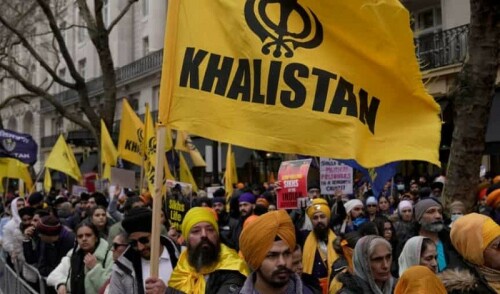Khalsa Day festivities in Canada’s Toronto were marked by slogans raised in favour of the Khalistan movement during a speech by Prime Minister Justin Trudeau, Indian media outlets reported on Monday.
The festival of Vaisakhi — also known as Baisakhi — honours the founding of the Sikh community known as the Khalsa in 1699. It also marks the beginning of a new solar year and the harvesting season.
India’s New Delhi Television Ltd reported that “loud chants” were raised in Sunday’s celebrations attended by “thousands” amid the presence of the Canadian premier, opposition leader Pierre Poilievre, Toronto Mayor Olivia Chow and prominent Canadian Sikh leader Jagmeet Singh, chief of the New Democratic Party.
“Trudeau, in a staunch assurance to the Sikh Community in the country, has said that the government is always there to protect their rights and freedoms at all costs,” the report said.
“To the nearly, 800,000 Canadians of Sikh heritage across this country, … we will always defend your community against hatred and discrimination,” he was quoted as saying in the report.
“The Canadian prime minister mentioned that they’re improving security and infrastructure by adding more security to community centres and places of worship, like gurdwaras,” reported IndiaToday.
Meanwhile, India summoned the Canadian deputy high commissioner and expressed “deep concern and strong protest” after the separatist slogans were raised.
Bilateral diplomatic relations soured last year after Trudeau said Canada was “actively pursuing credible allegations” that Indian agents were potentially linked to the June 2023 murder of a Canadian citizen.
India’s foreign affairs ministry said it had conveyed “deep concern and strong protest” at such actions “being allowed to continue unchecked at the event”.
The Canadian foreign ministry did not immediately respond to a request for comment.
What is the Khalistan Movement?
The movement wants an independent Sikh state carved out of India and dates back to India and Pakistan’s independence in 1947 when the idea was pushed forward in negotiations preceding the partition of the Punjab region between the two new countries.
The Sikh religion was founded in Punjab in the late 15th century and currently has about 25 million followers worldwide. Sikhs form a majority of Punjab’s population but are a minority in India, comprising two per cent of its population of 1.4 billion.
Sikh separatists demand that their homeland “Khalistan”, meaning “the land of the pure”, be created out of Punjab.
The demand has resurfaced many times, most prominently during an insurgency in the 1970s and 1980s which paralysed the Indian Punjab for over a decade.
The Khalistan movement is considered a security threat by the Indian government. The bloodiest episode in the conflict between the government and Sikh separatists occurred in 1984.
Then-prime minister Indira Gandhi sent the military into the Golden Temple, the holiest shrine for Sikhs, to evict separatist leader Sant Jarnail Singh Bhindranwale and his supporters, which infuriated Sikhs around the world.
A few months later, Gandhi was assassinated by her Sikh bodyguards at her home in New Delhi. The army launched operations in 1986 and 1988 to flush out Sikh militants from Punjab.
Sikh militants were also blamed for the 1985 bombing of an Air India Boeing 747 flying from Canada to India in which all 329 people on board were killed off the Irish coast.
The insurgency killed tens of thousands of people and Punjab still bears the scars of that violence.
Although the Khalistan movement has little support now in India, it has small pockets of backing among sections of the Sikh diaspora in Canada, which has the largest population of Sikhs outside Punjab, and in Britain, Australia and the US.













































Dear visitor, the comments section is undergoing an overhaul and will return soon.